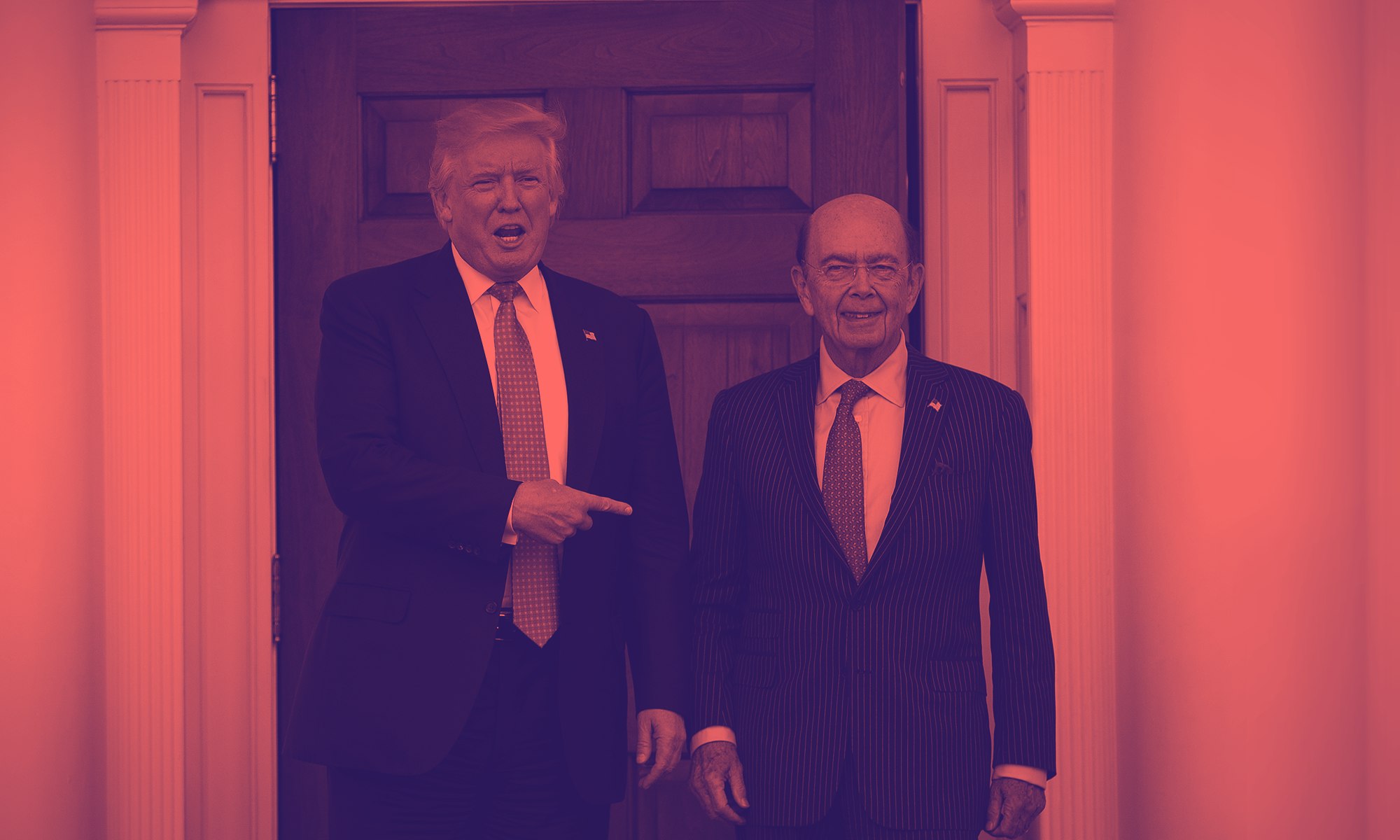The past year has been a victory march for low culture. It took nearly a century for schlock to fully supplant the few extant currents of the refined in American society; it was a long and bumpy road, full of stops and starts. Donald Trump’s inauguration was a gesture of finality in this process, bringing together the dumbest entertainment America had to offer — from 3 Doors Down to Duck Dynasty — as if to say this is how it is now. We elected a reality TV star as president, and there is no going back. Of course, Trump sent out a roll call for every last representative of low culture by simply entering the presidential race. And naturally, there was a response from the lowest of the low, the one medium that makes reality TV look insightful: newspaper comics. Enter Scott Adams, creator of Dilbert.
Dilbert, like all the most unimaginative comic strips, has spent nearly three decades hammering away at the thinnest of premises: The titular character works in an office and is often frustrated by corporate bureaucracy and his micromanaging boss. His tie sticks straight up for some reason. He has a talking dog, Dogbert, who — no shit — was originally named “Dildog.” Dilbert is memorable, in spite of its incredible dullness, because of its complete lack of ideology. The comic, first published in 1989, is often portrayed as being on the side of office workers, a voice for the underdog — but it gives no hint at a solution, other than that you just have to grin and bear it as capitalism suffocates you. As Norman Solomon wrote in his 1997 book, The Trouble With Dilbert: How Corporate Culture Gets the Last Laugh, middle managers and CEOs seemed to love the comic as much as the office drones taping it to their cubicle walls. At the height of Dilbert’s popularity in the mid-’90s, Bloomberg wrote that “comic-strip cutup Dilbert is a hit with the execs he lampoons.” By 1996, Xerox Corp. was including Dilbert in its official employee literature and Adams was in Newsweek voicing his support for the same corporate downsizing practices he had targeted in the comic. It would be an overreaction to describe Dilbert as “controlled opposition,” but Solomon calls it like it is: “an offbeat sugary substance that helps the corporate medicine go down.”
Ruminations on 1990s white-collar ennui seem quaint when viewed through a 21st-century lens. Adams based Dilbert on his experiences working as a financial analyst in the late 1980s, but offices have changed a lot in the interim 30 years. The salaried cubicle jobs rejected in Office Space and Fight Club are now objects of desire for survivors of the dot-com bubble and the 2007 financial crisis. The ersatz futurism of the sterile modernist office, unintentionally paying homage to Schindler’s List by sucking the color out of everything but a red iMac G3, is now a source of nostalgia. It could be a “grass is always greener” thing — or it could be that gaining the ability to fuck around online on the clock fundamentally transformed the nature of office work — but a not-insignificant portion of ���90s media is now incurably dated. The standard reaction to this development for those who created such media seems to be a turn toward far-right politics. Fight Club often finds itself misinterpreted by neo-fascists. Office Space creator Mike Judge regularly pals around with Alex Jones, at whose recent request he brought Western culture to its nadir by saying “Infowars dot com” in the Beavis and Butt-Head voice. Scott Adams, though less adept at creating an animated series (the Dilbert TV show lasted two seasons on the now-defunct network UPN), followed a similar path.
Ruminations on 1990s white-collar ennui seem quaint when viewed through a 21st-century lens.
Adams’ long slide into right-wing buffoonery was facilitated by his official Dilbert blog, which in 2008 started off, innocently enough, as a log of press clips and merchandise releases (order an “archival print” for only $39.99!), before giving way to some of the most vapid political writing this side of Reddit. The first post to mention politics, a 2008 entry titled “The Economy,” is brain-dead on its own terms but useful for understanding Adams’ rhetorical style, which resembles message board pedantry as much as it does the reflexive metacommentary utilized by freshmen who want to look smart in class without having done the readings. In the post, Adams asks: “According to the latest polls, the economy is the biggest issue for voters. So I ask myself which candidate has the most support from economists.” So he looks it up. “The best I could find on the Internet in a quick search was a list of (presumably) Democrat economists supporting Obama and a list of (presumably) Republican economists supporting McCain.” He then laments not being able to find any independent economists and asks his readers who they think is best for the economy — but wait! — what makes them experts on economics? There’s a lot going on here. By asking an either/or question of the world’s economists, Adams forces them to take a side, only to punish them for taking a side by accusing them of bias. His question is designed to exclude all possible answers. He asks the audience to answer his question, but preemptively declares all responses null and void by demanding “expertise,” which would quickly prove meaningless if two “experts” had opposing viewpoints. Ergo, all knowledge is, like, subjective and you can’t, like, answer a question, maaan.
A few days later, Adams posted the strongest reader argument for each candidate, but his deliberation left much to be desired: “I don’t think either man meets the minimum qualification I would like in a president. I just like the challenge of coming up with good arguments.” At least he admits that he finds coming up with good arguments challenging. It soon becomes clear that this is the only way he knows how to communicate. Even though Adams is nearly 60, everything he writes brings to mind the type of pseudo-intellectual The Simpsons parodied with Comic Book Guy — a thoroughly mediocre man who fancies himself an intellectual by extension of having bad hygiene and a repellent personality, the type who clogs up video game forums with the same sort of non-arguments and logic games that clog up the Dilbert blog.
The first time Adams made a detectable splash on the wider web with the Dilbert blog was in 2011. In a post titled “Men’s Rights,” he pulled out his familiar philosopher routine, blaming the readers for making him address the topic and detachedly outlining their trivial grievances about feminism before taking his stance: that men need to “get over it.” But why? He wrote: “The reality is that women are treated differently by society for exactly the same reason that children and the mentally handicapped are treated differently. It’s just easier this way for everyone.” This equivocation energized the internet against him for a few days, at which point he deleted his original post and replaced it with a shifty mea culpa. Adams whined: “I clearly wasn’t supporting every element of the Feminist movement, and therefore I was presumed an enemy and labeled a misogynist. I was also labeled an asshole, which I have come to understand is a synonym for male.” He claimed to be trolling, that he was playing devil’s advocate, that even the deletion of the original post was a “meta-joke,” and then scolded his audience for being so emotional in their misunderstanding of a post that was designed to be misunderstood.
Adams’ rhetorical style resembles message board pedantry.
Adams hit his stride as a political commentator when he began writing about Donald Trump in mid-2015. After Trump’s infamous comment accusing Mexicans of bringing drugs, crime, and rape over the border (which is refuted by actual crime statistics), Adams decided it was a good time for his trademark hemming and hawing. Trump only said some Mexicans are rapists! Even though immigrants commit crimes at rates lower than native-born Americans, that rate isn’t zero! He’s technically not wrong! “I’m not a Trump supporter. I’m just anti-outragism,” Adams wrote. Given that Trump’s 2015 comments about Mexicans inspired a number of hate crimes, including one where two of his supporters beat and urinated on a homeless Latino man who turned out to be a legal permanent resident, Adams’ refusal to stop playing debate-club games here made him come off as more of a sociopath than usual.
The next year brought a flurry of Trump-related posts on the Dilbert blog, with many of them analyzing Trump’s rhetorical style through the lens of a pickup artist, the pitiful nerd’s chosen method of needlessly analyzing basic human interaction. Adams ended these posts with a note: “I remind new visitors that I am not smart enough to know who would do the best job of president. All of the candidates seem competent to me. My interests are in Trump’s persuasion and negotiation skills.” Strange, since he wrote in 2008 that he didn’t think either Obama or McCain came “anywhere near the minimum requirement I would like to see in a president.” What that minimum requirement entailed, and why a possibly senile reality TV host with no political experience suddenly met it, was never explained.
Adams finally crossed into insanity in June 2016 when he sarcastically endorsed Hillary Clinton out of supposed fear for his life. He wrote that Clinton’s new strategy of attacking Trump as a racist demagogue was “likely to trigger a race war,” an always-wrong prediction beloved by neo-Nazi groups, and that in such a scenario he would be a “top-ten assassination target.” So Adams endorsed Clinton for his own personal safety, a fake-out so transparently stupid that it could only impress fans of Dilbert. While Adams remained careful not to say anything outwardly racist, this rhetorical move — painting oneself as a victim of censorship and violent retribution for vocally supporting white supremacy — is a favorite of figures like neo-Nazi Richard Spencer, who tried and failed to achieve martyrdom after a punch grazed his cheek at the inauguration protests. The next month, Adams complained of receiving “a lot of direct and indirect death threats,” a claim that recently dethroned “I got hacked” as the go-to response for wannabe trolls who dish it out but can’t take it. He went on to accuse the Clinton campaign of orchestrating a race war through attacks on police officers, saying that “the police shootings and the recent uptick in domestic racial violence are mostly Clinton’s doings to win the election.” In the same post, Adams admitted that his descent into madness turned out to be bad for his career: “Writing about Trump ended my speaking career, and has already reduced my income by about 40 percent.” Sad.
It seems counterintuitive that Scott Adams, defender of the common office drone, would ally himself with a billionaire whose catchphrase is “you’re fired,” but there are strong parallels between the two. For one, they both make you dread reading the newspaper. Neither is willing to acknowledge the real causes of the American worker’s declining fortunes, choosing to pin it all on the idiosyncrasies of office culture or the existence of immigrants. Most importantly, Adams and Trump both offer the working class cheap, stupid, and forgettable entertainment that placates dissatisfaction for a moment before a swift return to late-capitalist dread. We deserve better.






